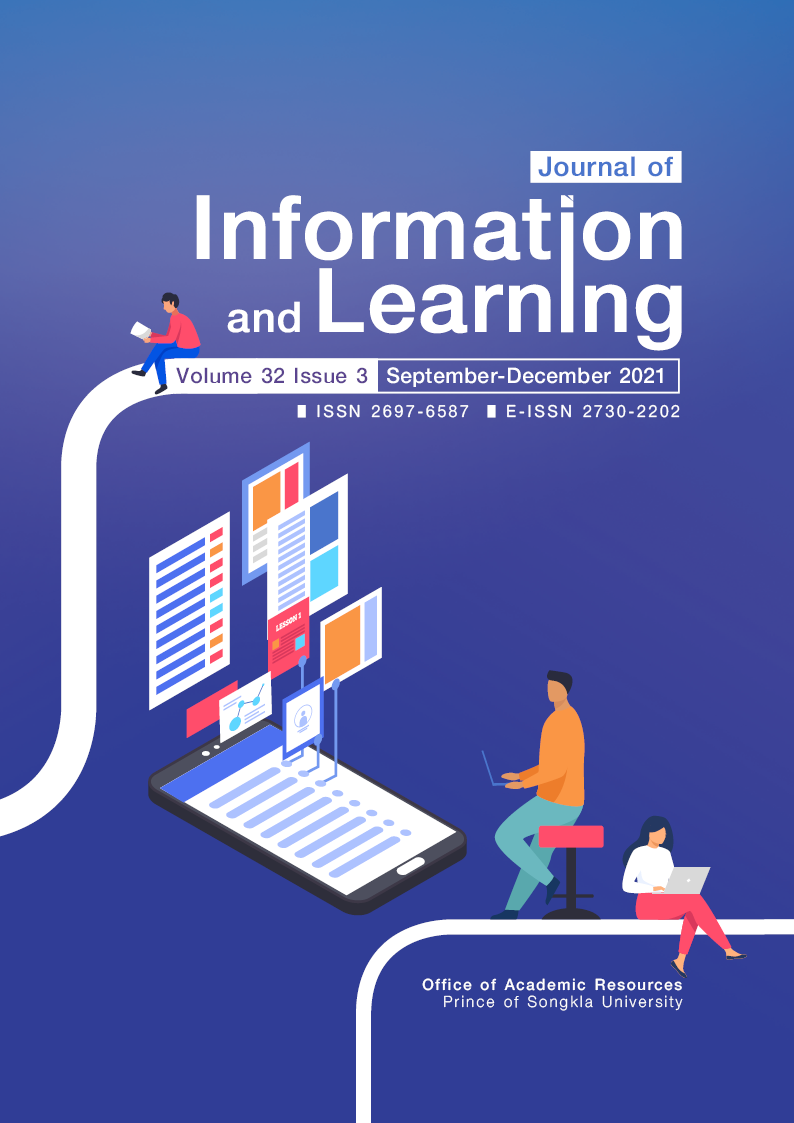Development of Massive Open Online Learning Environments to Promote Self-directed Learning based on Constructivist Approach
Main Article Content
Abstract
The purposes of this research were: 1) to develop massive open online learning environments, 2) to compare learner's pre-test and post-test performance, and 3) to investigate learners' satisfaction. The sample group were 45 students enrolling in Research in Educational Technology and Communications courses with at least 70 percent academic achievement. The following were the research tools: 1) lesson plan, 2) lesson material, 3) Massive Open Online Course, 4) an achievement exam, and 5) a satisfaction survey. The data were analyzed using descriptive statistics including mean, standard deviation and t-test dependent.
The results revealed that: 1) the development of the Massive Open Online Learning was of the highest quality, 2) the learner's post-test scores of learning achievement were significantly higher than their pre-test scores at the .01 level of significance, and 3) the results of the learner satisfaction study were at the highest level.
Article Details

This work is licensed under a Creative Commons Attribution-NonCommercial-NoDerivatives 4.0 International License.
The Journal of Information and Learning is operated by the Office of Academic Resources, Prince of Songkla University. All articles published in the journal are protected by Thailand copyright law. This copyright covers the exclusive rights to share, reproduce and distribute the article, including in electronic forms, reprints, translations, photographic reproductions, or similar. Authors own copyrights in the works they have created as well as the Office of Academic Resources. The Journal reserves the right to edit the language of papers accepted for publication for clarity and correctness, as well as to make formal changes to ensure compliance with the journal's guidelines. All authors must take public responsibility for the content of their paper.
References
Akkarakahasin, N. (2019). Theknik læ krabūankān sāngsan sư̄ mō chankrāfik phư̄a chai nai sư̄ ʻō̜nlai [Techniques and Creative Media Motion Infographic Processes for Use in Online Media] (Master's thesis). Bangkok University, Bangkok.
Bozkurt, A., Keskin, N., & Waard, I. (2016). Research Trends in Massive Open Online Course (MOOC) Theses and Dissertations: Surfing the Tsunami Wave. Journal of Open Praxis, 8(3), 203-221.
Chaijaroen, S. (2011). Education technology: Principles theories to practices. Khon Kaen: Klungnana Vitthaya.
Chaijaroen, S. (2014). Instructional design: Principles and theories to practices. Khon Kaen: Annaoffset.
Dechakhup, P., & Yindeesuk, P. (2014). kānčhatkān rīanrū nai satawat thī yīsipʻet [Learning Management in the 21st Century]. Bangkok: Chulalongkorn University.
Heanghom, N., & Chumsukon, M. (2017). A study of knowledge construction behavior and satisfaction using constructivist learning activities with learning resources in the community, social religion and culture of Grade 5 Students. Journal of Education Graduate Studies Research, Khon Kaen University, 11(4), 45-54.
Kanjag, I. (2016). Foundation of education technology. Khon Kaen: Klungnana Vitthaya.
Khamkaew, P., & Chaijaroen, S. (2019). Design and development of constructivist web-based learning environment model to enhance creative problem solving for vocational diploma Students. Academic Services Journal, Prince of Songkla University, 30(1), 1-10.
Khlaisang, J. (2017). Kānphalit læ chai sư̄ yāng pen rabop. Bangkok: Chulalongkorn University.
Meesuwan, W. (2018). The research in educational technology. Phitsanulok: Naresuan University.
Mingsiritham, K. (2009). Self-directed learning on web-based learning. Journal of Education, Khon Kaen University, 32(1), 6-13.
Napapongs, W. (2009). The research in educational technology and innovation. Pattani: Pattani Karnchang.
Phahay, S. (2017). The paradigm of educational technology in the digital age. Phrae: Phraethai utsaha kanphim.
Shounchupon, A., (2015). Concept of self-directed learning with education management. Journal of Graduate Studies, Valaya Alongkorn Rajabhat University, 9(1), 213-221.
Susing, J., & Chaijaroen, S. (2020). Designing framework of constructivist web-based learning environments with Augmented Reality to enhance creative thinking on topic of animation for grade 9 students. Journal of Information and Learning, 31(2), 1-9.
Suwanvapee, P., & Kanjug, I. (2020). The development of gamification learning environment to enhance problem-solving thinking skills in computing science sourses on problem-solving topic for Mathayomsuksa 1 Students at Nongwuasorpittayakhom School. Journal of Graduate Research, Chiang Mai Rajabhat University, 11(1), 15-27.
Wiratchai, N. (2020, October 16). Kānkamnot khanāt tūayāng nai kānthotsō̜p sommuttithān wičhai [Determination of sample size in research hypothesis testing]. Retrieved from https://lllskill.com/web/index.php
Yuneyong, J., & Soodsang, N. (2017). Study of the achievement based on constructivist concept of design principle via computer instruction of Undergraduate Students. Art and Architecture Journal, Naresuan University, 8(1), 1-11.
Zhu, M., Sari, A., & Bonk., C. (2018, June). A systematic review of MOOC research methods and topics: Comparing 2014-2016 and 2016-2017. EdMedia + Innovate Learning 2018, Netherlands. Abstract retrieved from https://www.trainingshare.com/


